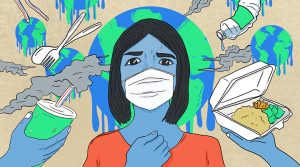On the first day of my intro sustainability class this semester, my professor told us how the class may depress us and that if we need to talk about it, she’s always here for us. “We’ll get through this together,” she assured us. This is a part of sustainability we often neglect: the mental toll it can take on us. Ecological grief is “similar to other forms of grief” as Aviva Fialkow writes in her article “Eco-grief: How to cope with the emotional impacts of climate change” (University of Calgary, 2021). These feelings of sadness often arise after forest fires, extreme weather events, pollution, and other forms of environmental degradation (University of Calgary, 2021). There is a similar form of mental distress when it comes to climate known as “eco-anxiety.” There is a bit of a debate on if these phenomena matter or not, with some talking about how there are more important health issues relating to climate change such as heat-related stress or the health consequences of floods and droughts (The BMJ Opinion, 2021). Research on the mental health side of environmental health is fairly new but the evidence collected thus far suggests that the problems associated are very serious. One American study highlights the growing stress associated with climate as a large number of people ages 27 to 45 reported “growing concerns about raising children during a climate apocalypse” (The BMJ Opinion, 2021). I often see jokes on TikTok that the most effective form of birth control is environmental science classes. Turns out, there is some truth in that. One survey conducted in 2020 found that “one in four cited climate change as a factor in why they do not currently have children” (The New York Times, 2021). There is a growing number of people who feel that it is unethical to give birth to children due to the growing concern about climate change.
People feel shame when they grab an extra bag at the store, sadness when they think of the future, and anxious whenever a news report about how we’ve passed the point of no return. So that raises the question: what can we do about it? Aiva Fialkow offers a few different coping mechanisms. One is that we have to focus on what we have control over and not what we don’t (University of Calgary, 2021). For example, I work at Publix and we have a policy that we have to give customers bags no matter what. It bugs me to no end when I have to bag an order in plastic and then paper. But that isn’t something I have control over: my company makes the rules and as an employee, I have to follow the rules so I shouldn’t feel bad about it. Fialkow also suggests “finding solace in natural spaces” (University of Calgary, 2021). Many people find that tending to a garden or going on a hike not only helps them feel better about their eco-anxiety but also contributes to their well-being overall. As we continue to try to solve the issues of our planet, we need to make sure we aren’t neglecting our feelings so we can effectively reduce damage to the Earth.
https://ucalgary.ca/news/eco-grief-how-cope-emotional-impacts-climate-change
https://blogs.bmj.com/bmj/2021/10/06/the-climate-crisis-and-the-rise-of-eco-anxiety/
https://www.nytimes.com/2021/11/20/style/breed-children-climate-change.html

